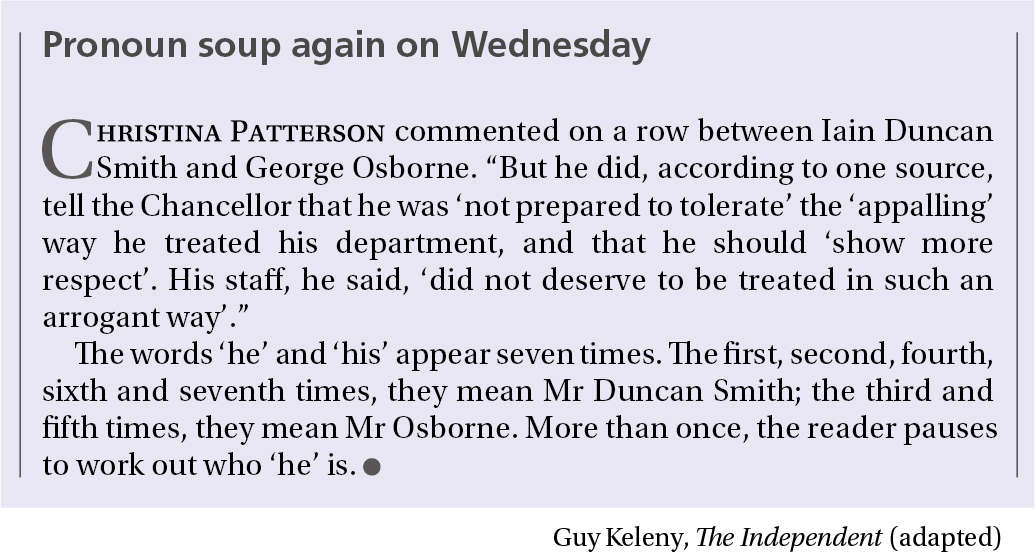Pronouns and other proforms
Avoiding unnatural/ungrammatical repetition
When we refer again to a person or thing that has already been mentioned, we normally use a pronoun (e.g. he, she, it) instead of repeating the original noun phrase. When the reference is very close to the original mention, repetition (unless there is a special reason for it) is usually not only unnatural, but ungrammatical.
- Rachel changed her job because she was unhappy with the conditions. (More normal than … because Rachel was unhappy with the conditions.)
- The suggestion was understandably ignored: the management disapproved of it. (More normal than … the management disapproved of the suggestion.)
- There were times when Cartwright hated himself. (not
… Cartwright hated Cartwright.)
This kind of thing happens with other words besides nouns.
- He did not smoke, but his wife did. (More normal than … but his wife smoked.)
- They were not sure whether the road was open, but they believed so. (More normal than … they believed that the road was open.)
- The Royal Hotel was highly recommended, so the party agreed to stay there. (More normal than … to stay at the Royal Hotel.)
However, repetition is necessary and normal when alternatives are discussed.
- She was offered potatoes or rice, and decided on rice.
- The only options were to dance or to go for a walk: they went for a walk.
For more details, (see here) (ellipsis) and (see here) (so).
Avoiding ambiguity
When pronouns such as he, she, it are used, it is important to make sure the reference is clear.
- Lucy told Alice she had made a bad mistake. (Who made the mistake?)
Here is a note from the Independent newspaper apologising for confusing readers the day before.

Text version
Pronoun soup again on Wednesday
Christina Patterson commented on a row between Iain Duncan Smith and George Osborne. "But he did, according to one source, tell the Chancellor that he was 'not prepared to tolerate' the 'appalling' way he treated his department, and that he should 'show more respect'. His staff, he said, 'did not deserve to be treated in such an arrogant way'."
The words 'he' and 'his' appear seven times. The first, second, fourth, sixth and seventh times, they mean Mr Duncan Smith; the third and fifth times, they mean Mr Osborne. More than once, the reader pauses to work out who 'he' is.
Guy Keleny, The Independent (adapted)
For more about the use of this/that and it (referring to things that have just been mentioned), (see here).
Avoiding duplication
In writing and more formal speech, English (unlike some languages) does not normally use a pronoun to repeat a noun phrase that comes in the same clause.
- The wall needed painting. (not
The wall, it needed painting.) - Good morning, Jack. I spoke to Professor Anson yesterday. (More natural than … Professor Anson, I spoke to him yesterday.)
However, this kind of repetition is common in informal speech, when people announce a topic and then make a sentence about it (see here).
- That friend of your mother’s – she’s on the phone.
- Your bicycle wheels – why don’t we put them in the garden shed?